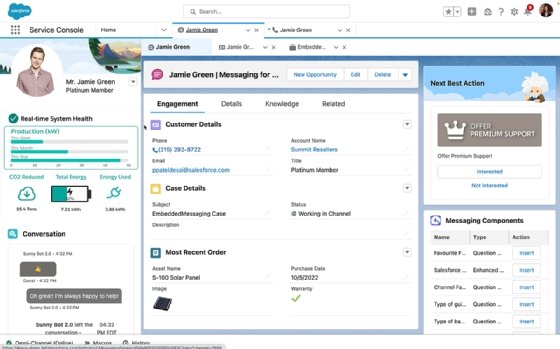
Getty Images/iStockphoto
Salesforce releases cloud contact center update
New capabilities in Salesforce Contact Center give agents AI tools for analyzing voice conversations, AI bots for self-service and call routing, and more.
ORLANDO -- Salesforce has released an update to its cloud contact center bundle of services that provides Service Cloud users access to customer data platform connections, automations and AI.
It also gets a formal name: Salesforce Contact Center. Among the new capabilities in the update are tools for workforce management, survey management, AI tools for analyzing voice conversations, AI bots for self-service and call routing. Contact Center was released here at the ICMI Contact Center Expo.
All of Salesforce's clouds, including Sales Cloud and Commerce Cloud, will eventually get updates for Genie, a suite of data management services previewed last month at Dreamforce. Salesforce pitched Genie as a way to generalize its CDP -- typically a marketing tool -- for sales, service, e-commerce and even MuleSoft and Tableau. Salesforce said that Genie will also permeate Salesforce Industries vertical clouds, with specific workflows and shortcuts tailored to different businesses.
While Salesforce Service Cloud users await a presumed larger Genie update, joint users of Contact Center and the Salesforce CDP will be able to generate more granular, personalized insights right now. Plugging CDP into Contact Center offers a 360-degree view of a customer's activity data across sales, e-commerce and marketing, said Clara Shih, CEO of Salesforce Service Cloud.
 Clara Shih
Clara Shih
"AI is only as good as the data sets that you give it to learn [from]," Shih said. "If it's got limited context within the context of the contact center, it performs really well. We've seen that with a number of customers. But if you give it a 360-degree view -- just like if you gave an agent a 360-degree view -- it'll make better decisions."
Analyst: More to be seen
The Salesforce Genie brand appears to promise things to come, said Dan Miller, founder of Opus Research. Salesforce's execution of these new capabilities -- yet to be fully revealed -- will likely uncover issues that customers will press Salesforce to resolve.
In Salesforce Contact Center, for example, Miller said features such as interactive voice response and automatic call distribution to remote workers pose thorny tech problems. Salesforce will eventually have to combine Genie and Service Cloud Voice features to more fully support those two automation needs.
With native features such as chat connectors to SMS, web and social channels, and AI conversation insights, Miller predicts Salesforce Contact Center will target rivals such as Talkdesk and Nice, and not so much Microsoft and AWS, whose underlying public cloud infrastructure complements their contact center tech. In fact, Salesforce and AWS are close partners in cloud contact center tech.
"Salesforce is developing things around Amazon Connect, understanding that those customers are looking for a more coherent organization of Salesforce's real-time analytics capabilities and the stuff that is in Service Cloud," Miller said.
Contact centers need tools to aggregate customer data in the agent's console and reduce application switching at their workstations, said Brad Cleveland, ICMI co-founder and keynote speaker at the conference. Such "swivel chair" customer service is why agents must put customers on hold while looking up details of their cases.
The larger challenge for contact centers is that agents don't have access to data when they need it, regardless of the cloud contact center console they use.
"Taking us closer to that single source of truth and being able to access that kind of information on the fly? I don't think anyone would say we're there yet," Cleveland said. "Salesforce is making some really great strides, but we've got to have processes to support it."

Service Cloud Salesforce's top earner
Service Cloud is now Salesforce's biggest cloud in terms of subscription and services revenue. It overtook Sales Cloud during the first months of the pandemic and has not relinquished the top spot since -- despite Salesforce combining Marketing Cloud and Commerce Cloud into a single unit in its reports.
"It really speaks to how service is the heart of the customer relationship," Shih said. "If you're not getting service right, then you're not going to have that customer for very long.
"In this world where every brand is competing for customer's attention -- and third-party cookies are going away -- it's been harder than ever to acquire new customers," Shih added.
Cleveland said Service Cloud's surge to the top spot validates an oft-repeated theme in his presentations: Automation hasn't replaced agents. In fact, demand for customer service agents during workforce disruptions such as the Great Resignation has increased.
"We have heard from so many people over the years that service is going to be more and more automated, and we won't need [as many people]," Cleveland said. "Quite the opposite has happened. The pie has grown."
Salesforce Contact Center costs $150 per user, per month.
Don Fluckinger covers enterprise content management, CRM, marketing automation, e-commerce, customer service and enabling technologies for TechTarget Editorial.








